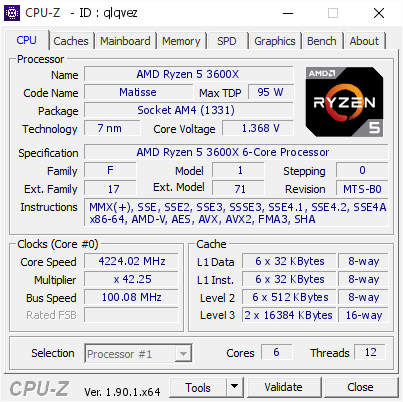- Joined
- Jan 8, 2020
- Messages
- 834 (0.41/day)
- Location
- Maryland, USA
| Processor | Ryzen 5 5600X |
|---|---|
| Motherboard | MSI MPG X570S Carbon Max Wifi |
| Cooling | CPU: bequiet! Dark Rock 4. Case fans: 2x bequiet Silent Wings 3 140s, 2x Silent Wings 3 120s |
| Memory | 2 x 8 GB Patriot Viper Steel DDR4-4400 C19 |
| Video Card(s) | Sapphire NITRO+ RX 5700 XT |
| Storage | 2TB Mushkin Pilot-E M.2, 1 TB SK Hynix P31 M.2, 1 TB Inland Professional, 500 GB Samsung 860 Evo |
| Display(s) | MSI Optix MAG271CQR 1440p 144Hz, MSI Optix MAG241C 1080p 144Hz |
| Case | Lian Li Lancool III |
| Audio Device(s) | Philips SHP9500, V-Moda BoomPro, Sybasonic Better Connectivity USB DAC/Amp |
| Power Supply | EVGA SuperNOVA G3 80+ Gold 750W |
| Mouse | Glorious Model D Wireless |
| Keyboard | Custom Qwertykeys Navy QK80: Sarokeys Strawberry Wine switches, GMK CYL DMG3 keycaps |
When PBO/XFR2 is enabled? I recall a while back Buildzoid complaining about the PBO algorithm. Something about how it's extremely stupid that the first thing PBO does is crank the voltage up.You are reffering to 1xxx and 2xxx chips ? I ask because my 2700X defaults to 1.45V in BIOS.
You may want to read this post from r/overclocking...
"Conclusion, based on my testing and several others that have seen degradation above 1.38v on this subreddit, I can solidly say, since AMD has released zero safe voltages for this chip, if you value the longevity of your Ryzen gen 2 chip for more than around 4 months, stick to 1.375v as your max voltage. "
and this from the Anandtech forums:
Page 72 - Ryzen: Strictly technical
Page 72 - Seeking answers? Join the AnandTech community: where nearly half-a-million members share solutions and discuss the latest tech.
"The seen behavior suggests that the full silicon reliability can be maintained up to around 1.330V in all-core workloads (i.e. high current) and up to 1.425V in single core workloads (i.e. low current). Use of higher voltages is definitely possible (as FIT will allow up to 1.380V / 1.480V when scalar is increased by 10x), but it more than likely results in reduced silicon lifetime / reliability."









